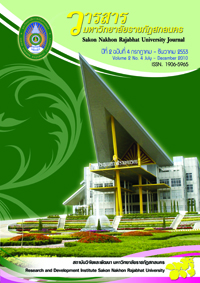Good Governance in Water Management in the Lower Songkram River Basin, Nakhon Phanom Province, Northeastern Region, Thailand
Abstract
Abstract
The purposes of this study were 1) to investigate the process of water management for off-season rice fields in the lower Songkhram river basin and 2) to develop a water management model for off-season rice fields under the good governance system in the lower Songkhram river basin, Nakhon Phanom province, Thailand.The populations were the stakeholders who are directly involved with water consumption and water management for off-season rice fields in the villages where water management for off-season rice fields has been going on for over 40 years. The samples for quantitative research were 338 subjects, including 300 off-season rice farmers, 27 Tambon administration organization personnel, and 11 state organization officers. There were also 40 subjects purposively selected for qualitative research method. Research instruments included: 1) questionnaire for state and private organization personnel; 2) questionnaire for off-season rice farmers and other stakeholders in the area; 3) semi-structured questionnaire for the executives of state and private organizations; 4) focus group interview; 5) community workshop note; and 6) observation form. The statistical methods used for quantitative data analysis included percentage, mean, and standard deviation. The qualitative data were analyzed by descriptive analysis. The results were as follows: 1) In the past, the water management system for off-season rice fields in the lower Songkram river basin was under the control of the Irrigation Department, Ministry of Agriculture and Cooperatives. Because of water management by state organizations, the off-season rice farmers were allocated insufficient water. The key mechanics administering the water allocation for the farmers in the area were Irrigation Department bodies. These bodies failed to understand the contexts of the areas of water shortage where the allocation had to be properly done. At present, local administration organizations are responsible for water distribution, water allocation, and water conservation, the responsibilities from the Irrigation Department. However, these local organizations encountered a lot of problems because they were unprepared for the responsibility, lacked understanding and awareness in the water management for offseason rice fields, spent the budget for other purposes rather than dealing with the problems arisen from water distribution and allocation, and lacked proper communication to make the farmers better understand water management, and 2) The water management model for off-season rice fields under the good governance system included legitimacy, fairness, transparency, accountability, co-ordination, effectiveness and efficiency in water management, and responsibility for the consequences as a result of water management for the offseason rice fields. The structure of water management system included law, behavior, power hierarchy, power relationship, community rights, individual rights, and information.









